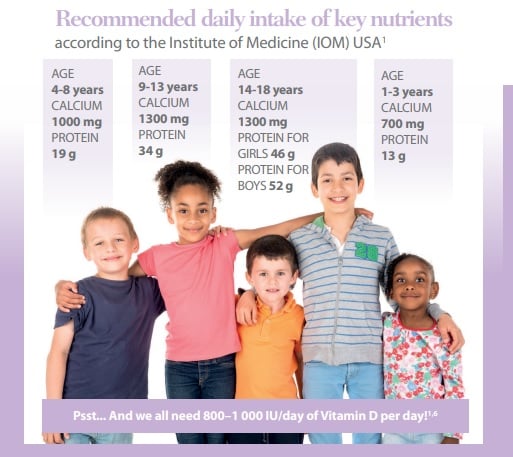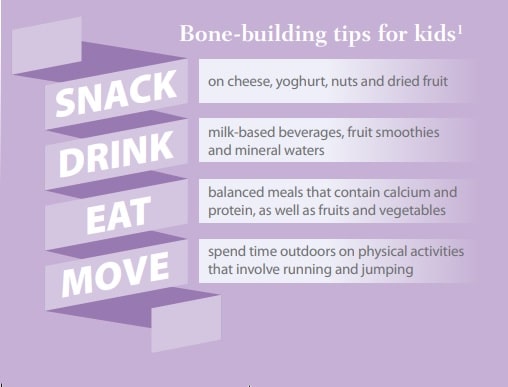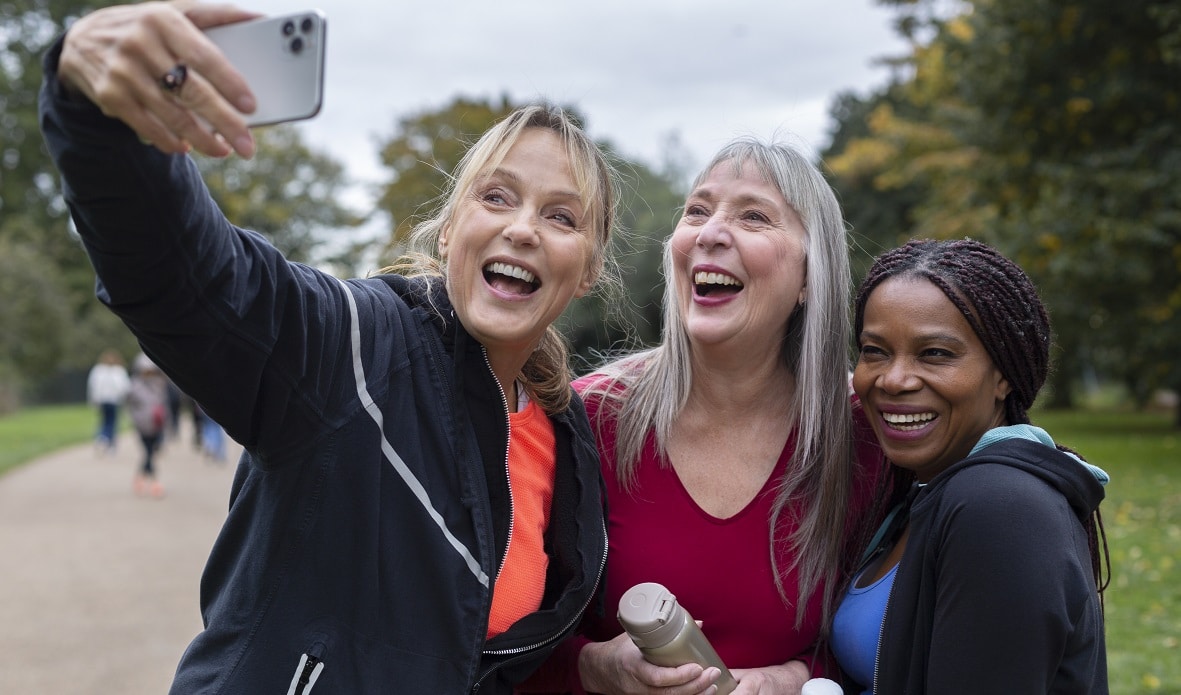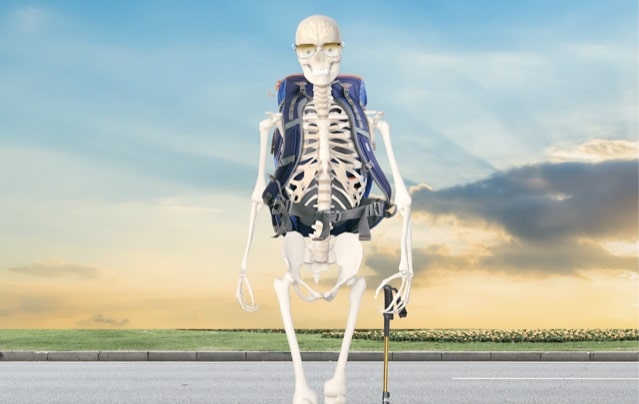Osteoporosis
Osteoporosis



Setting the foundation for bone health throughout life

What are the key nutrients for bone health?
 2. VITAMIN D Vitamin D plays key roles in the development and maintenance of healthy bones. It assists calcium absorption from food in the intestine and ensures correct renewal and mineralisation of bone.1 The primary source of Vitamin D is the sun’s trigger to synthesise the vitamin in our skin, or from food as a secondary source.1 How much sun exposure do you need? Vitamin D is made in the skin when it is exposed to UV-B rays in sunlight. Due to our increasingly indoor lifestyles, low levels of vitamin D have become a worldwide problem as they can jeopardise bone and muscle health.1 Generally, you should try to get 10–20 minutes of sun exposure to your bare skin (face, hands and arms) outside peak sunlight hours (before 10 AM and after 2 PM) daily – without sunscreen – and taking care not to burn.1
2. VITAMIN D Vitamin D plays key roles in the development and maintenance of healthy bones. It assists calcium absorption from food in the intestine and ensures correct renewal and mineralisation of bone.1 The primary source of Vitamin D is the sun’s trigger to synthesise the vitamin in our skin, or from food as a secondary source.1 How much sun exposure do you need? Vitamin D is made in the skin when it is exposed to UV-B rays in sunlight. Due to our increasingly indoor lifestyles, low levels of vitamin D have become a worldwide problem as they can jeopardise bone and muscle health.1 Generally, you should try to get 10–20 minutes of sun exposure to your bare skin (face, hands and arms) outside peak sunlight hours (before 10 AM and after 2 PM) daily – without sunscreen – and taking care not to burn.1Selection of foods containing Vitamin D1
 3. PROTEIN1,2 Protein provides the body with a source of essential amino acids necessary for health. Adequate protein intake is essential for the building of peak bone mass during childhood and adolescence (affecting skeletal growth) and for the preservation of bone mass with ageing. Protein undernutrition also leads to reduced muscle mass and strength in seniors, which is a risk factor for falls. Selection of foods containing protein1,2 Dairy products provide both calcium and protein and have been associated with higher bone strength in both men and women. Excellent sources of animal protein include lean red meat, poultry, fish as well as eggs.
3. PROTEIN1,2 Protein provides the body with a source of essential amino acids necessary for health. Adequate protein intake is essential for the building of peak bone mass during childhood and adolescence (affecting skeletal growth) and for the preservation of bone mass with ageing. Protein undernutrition also leads to reduced muscle mass and strength in seniors, which is a risk factor for falls. Selection of foods containing protein1,2 Dairy products provide both calcium and protein and have been associated with higher bone strength in both men and women. Excellent sources of animal protein include lean red meat, poultry, fish as well as eggs.Micronutrients that support bone health
Building bones early in life
Calcium and protein-rich nutrition boosts bone development
Getting enough of the sunshine vitamin

Exercise and lifestyle matter

Maintaining healthy bones as an adult
- Ensure bone-healthy nutrition, with sufficient calcium, protein, vitamin D and important micronutrients
- Engage in weight-bearing and muscle strengthening exercise
- Avoid negative lifestyle factors such as smoking and excessive alcohol use
Adopting a bone-healthy lifestyle is of critical importance and adults need to pay particular attention at key points in their lives. In women, this is around the age of menopause when they experience a period of rapid bone loss due to a reduction in protective oestrogen levels. In men, bone loss accelerates after the age of 70 years.1
Keep up your intake of dietary calcium
- Consume dairy products as they are calcium rich; add low-fat cheeses to your meals
- Try calcium-set soy, which can be used as a substitute for meats
- Drink milk or calcium-enriched substitutes – and add to your coffees and tea
- Eat yoghurt regularly as a nutritious breakfast or snack
- Add wholegrains or seeds like quinoa and chia to your meals
- Snack on nuts or dried fruit
- Drink calcium-rich mineral water (check the labels)
- Choose vegetables that are especially calcium rich (such as cress, broccoli, okra)
- Add chickpeas, lentils and white beans to your meals
Are you at risk of vitamin D deficiency?
 Adults at greater risk of deficiency include anyone who lives at latitudes with minimal exposure to sunlight and people who are obese, have a dark skin tone, cannot expose their skin to the sun for medical or cultural reasons, or have diseases that reduce uptake of vitamin D from the intestine (e.g., Crohn’s disease). If you have any of these risk factors, measurement of vitamin D, based on 25-hydroxyvitamin D levels in the blood, may be advisable. Supplementation may then be prescribed if required.1
Adults at greater risk of deficiency include anyone who lives at latitudes with minimal exposure to sunlight and people who are obese, have a dark skin tone, cannot expose their skin to the sun for medical or cultural reasons, or have diseases that reduce uptake of vitamin D from the intestine (e.g., Crohn’s disease). If you have any of these risk factors, measurement of vitamin D, based on 25-hydroxyvitamin D levels in the blood, may be advisable. Supplementation may then be prescribed if required.1Proteins and healthy body weight

Nutrition in seniors: stay strong and mobile*
More calcium, protein and vitamin D needed
 The International Osteoporosis Foundation recommends that seniors aged 60 years and over take a Vitamin D supplement at a dose of 800–1 000 IU/day. Vitamin D supplementation at these levels has been shown to reduce the risk of falls and fractures by about 20 %.1
The International Osteoporosis Foundation recommends that seniors aged 60 years and over take a Vitamin D supplement at a dose of 800–1 000 IU/day. Vitamin D supplementation at these levels has been shown to reduce the risk of falls and fractures by about 20 %.1Exercise enhances the benefits of bone-healthy nutrition

Treatment for those at high risk
Non-age related nutritional factors
Getting enough calcium despite lactose intolerance

For further information about osteoporosis, visit the National Osteoporosis Foundation South Africa website at www.osteoporosis.org.za
Information is also available on the World Osteoporosis Day website: www.worldosteoporosisday.org
For paitent education & HCP information visit

Medical References
- International Osteoporosis Foundation. Serve up bone strength throughout life. [Brochure]. [Online] 2015. Accessed 2023/01/13. Available from https://www.osteoporosis.foundation/sites/iofbonehealth/files/2022 03/2015_ServeUpBoneStrengthThroughoutLife_Brochure_English.pdf.
- Kanis, JA, Cooper, C, Reginster J-Y. European guidance for the diagnosis and management of osteoporosis in postmenopausal women. Osteoporos Int 2019,30:3–44.
- A Guide to Calcium-Rich food. International Osteoporosis Federation. [Online]. Accessed 2023/01/13. Available from https://www.nof.org/patients/treatment/calciumvitamin-d/a-guide-to-calcium-rich-foods/.
- Higgs, J. Derbyshire, E. Styles, K. Nutrition and osteoporosis prevention for the orthopaedic surgeon. Efort Open Rev. 2017 Jun;2(6):300–308.
- Link R. 12 Evidence-Based Health Benefits of Magnesium. Healthline. [Online] 2022 Feb 7. [Accessed 2023/01/13] Available from https://www.healthline.com/nutrition/magnesium-benefits.
- Institute of Medicine 2006. Dietary Reference Intakes: The Essential Guide to Nutrient Requirements. 2006. The National Academies Press. [Online] Accessed 2023/01/13. Available from http://nap.edu/11537.
- International Osteoporosis Foundation. 3 Steps to unbreakable bones. Vitamin D, calcium and exercise. [Brochure] [Online] 2011. Accessed 2023/01/13. Available from: https://www.osteoporosis.foundation/sites/iofbonehealth/files/2019-06/2011_3StepsUnbreakableBones_TR_English.pdf.
- National Institute of Diabetes and Digestive and Kidney Diseases. Eating, Diet, & Nutrition for Lactose Intolerance [Online] 2018. Accessed 2023/01/13. Available from https://www.niddk.nih.gov/health-information/digestive-diseases/lactose-intolerance/eating-diet-nutrition.
Adcock Ingram Healthcare (Pty) Ltd. Reg. No. 2007/019928/07. Private Bag X69, Bryanston, 2021, South Africa. Customer Care: 0860 ADCOCK / 232625. www.adcock.com. 2023021010257846 April 2023.






